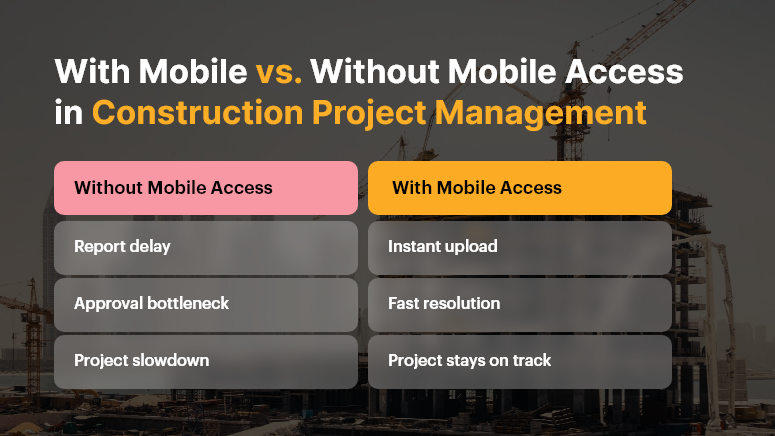Construction is a highly dynamic industry that demands agility, communication, and quick decision-making. Today, leveraging mobile access in construction project management software is transforming the way projects are managed, both on-site and off-site.
As construction projects grow in complexity, having real-time access to project data becomes essential for teams working across different locations.
In this blog, we will discuss the significant benefits of mobile access in construction management software, how it enhances productivity, and why it’s becoming indispensable in modern construction operations.

Why Mobile Access is Essential in Construction Project Management
Managing a construction project involves juggling tasks, timelines, budgets, and resources. Traditionally, communication was limited to phone calls, emails, or in-person meetings, which led to delays and miscommunication. Today, construction project management software with mobile access eliminates these barriers by providing instant updates and real-time collaboration across all stakeholders.
Here’s why mobile access matters in modern construction:
- Real-Time Communication: Immediate updates, messaging, and notifications between teams and the office.
- Task Tracking: Managers and field workers can track progress, reassign tasks, and set deadlines directly from their mobile devices.
- On-Site Documentation: Workers can capture photos, videos, and notes to keep the project documented, eliminating paperwork.
- Centralized Data Access: Contractors and site managers have access to the latest plans, blueprints, and documents, anywhere, anytime.
Mobile access to construction project management software streamlines workflows, boosts productivity, and reduces the chances of errors, ensuring timely project completion.
Key Benefits of Mobile Access in Construction Project Management Software
Mobile functionality in construction management software provides several advantages that enable projects to run more smoothly and efficiently. Let’s explore these key benefits:
1. Real-Time Updates and Notifications
Construction timelines are fluid, with tasks constantly changing due to unforeseen issues such as weather delays, material shortages, or design changes. Mobile access ensures that:
- Updates are pushed instantly to team members, whether they are on-site or off-site
- Supervisors can modify timelines or reassign tasks on the go
- Critical information, like design changes or new tasks, is immediately accessible
Real-time notifications ensure no one misses important changes, keeping projects on schedule and under budget.
2. Enhanced Collaboration Across Teams
In construction, clear communication between the field and the office is crucial. Mobile access fosters better collaboration by enabling:
- Sharing of images, documents, and plans between teams instantly
- Direct messaging within the app eliminates the need for phone calls or emails
- Seamless coordination between subcontractors, contractors, and project managers
With construction project management software, mobile tools allow teams to collaborate in real-time, regardless of location.
3. Faster Issue Resolution
Construction projects often face unexpected issues, such as design flaws, material shortages, or safety hazards. Mobile access allows field workers to:
- Capture issues, add notes, and upload photos directly into the project management system
- Collaborate with architects, engineers, or project managers to resolve problems immediately
- Track the status of ongoing issues and the steps being taken to fix them
The ability to address issues in real-time leads to faster resolutions and minimized downtime, keeping projects on track.
4. On-the-Go Task and Resource Management
Managing tasks and resources is a dynamic, ongoing process in construction. Mobile access allows construction managers to:
- Assign or modify tasks while on the move, keeping the project fluid and adaptable
- Monitor team productivity in real-time and adjust resources as needed
- Access up-to-date reports on project status, labor utilization, and material inventory
Construction project management software with mobile functionality ensures that no task is missed and resources are allocated efficiently, improving overall productivity.
5. Access to Key Documents Anytime, Anywhere
Blueprints, RFIs, and project plans are central to every construction project. With mobile access to construction project management software, your team can:
- Open and view up-to-date drawings, documents, and specifications on-site
- Use version-controlled documents to ensure everyone is working with the most recent information
- Quickly access technical manuals, safety guidelines, and site-specific documents without leaving the field
This level of accessibility reduces the need for time-consuming back-and-forth between the office and job site, ensuring quick decisions can be made.
Top Mobile Features to Look For in Construction Project Management Software
When selecting construction project management software for mobile access, consider tools that offer the following features to maximize efficiency:
- Cross-platform mobile apps (iOS and Android)
- Offline capabilities for areas with poor internet connectivity
- Push notifications for instant task and schedule updates
- Document and photo upload features for field documentation
- Task tracking with real-time status updates
- Voice memo support for quick communication
- GPS and location tagging for tracking on-site progress
- Mobile-friendly Gantt charts and timelines
These features ensure that your construction management software adapts to the unique demands of the field while offering powerful on-the-go capabilities.
Improving Field Productivity with Mobile Access
Field productivity is a critical driver of project success, as every hour counts on construction sites. With mobile access, construction teams can:
- Minimize downtime: Access to real-time information means fewer delays waiting for approvals or updates.
- Increase efficiency: Workers can quickly check task lists, upload updates, and communicate with project managers without leaving the job site.
- Track time and resources: Keep track of labor hours, equipment usage, and material deliveries to maintain budget and schedule adherence.
Mobile access through construction project management software allows managers to keep their team aligned and focused, driving increased productivity.
Case Example: Real-Time Mobile Access in Action
Let’s look at an example of how mobile access changes the course of a construction project:
- Without mobile access: A supervisor notices a discrepancy in the foundation layout. They write it down, go back to the trailer, file a report, and wait for approval. This causes delays and potentially costly rework.
- With mobile access: The supervisor takes a photo, tags the issue with a note, and instantly uploads it into the software. The project manager receives it in real-time, consults with the architect, and approves the fix — all within minutes. The issue is resolved quickly, saving both time and money.
This shows how real-time mobile access helps avoid delays, reduce rework, and keep projects within budget.
Challenges You Can Overcome with Mobile Construction Project Management Software
Using construction project management software with mobile capabilities helps mitigate some of the industry’s common challenges, including:
- Communication breakdowns between the office and field teams
- Missed or outdated documents that cause confusion or delays
- Duplicated efforts or rework due to untracked task progress
- Project delays caused by inefficient approvals and decision-making
- Budget overruns from untracked changes or errors
Mobile-enabled construction software offers a comprehensive solution to these problems, helping teams work smarter, not harder.
Conclusion
Mobile access is transforming the construction industry. By integrating construction project management software with mobile functionality, project teams gain real-time collaboration, increased efficiency, and greater control over tasks and resources. As the construction industry moves toward digital solutions, having the right mobile tools ensures smoother workflows, fewer errors, and timely project delivery.
FAQs
Q1. Why is mobile access important for small construction teams?
Even small teams benefit from mobile access as it improves communication, task tracking, and document sharing, reducing the time spent on administrative tasks and enabling real-time updates.
Q2. Is mobile construction software secure?
Yes, modern construction project management software uses encryption, secure cloud storage, and role-based access to protect sensitive data.
Q3. Can construction workers use mobile apps offline?
Many mobile apps offer offline functionality, allowing users to update information when connectivity is restored.


